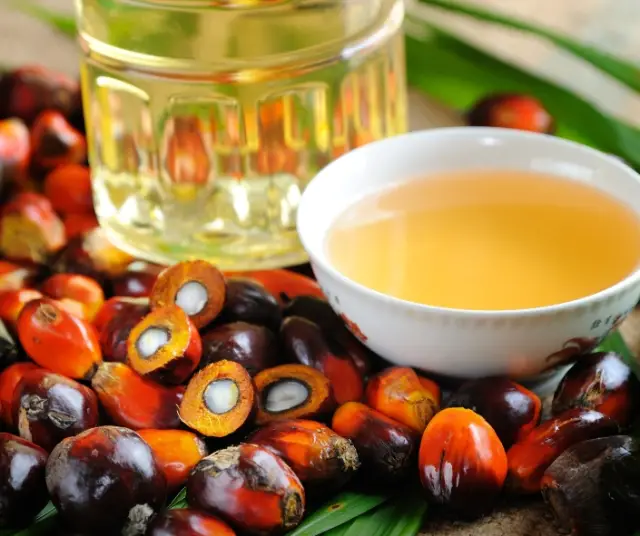Palm oil is a product that has generated great controversy in recent years. On the one hand, it is a common ingredient in a wide variety of food and non-food products that we consume daily. On the other hand, its production has been the subject of criticism due to its environmental and social impact.
What is palm oil?
Palm oil is a type of vegetable oil obtained from the pulp of the fruit of the oil palm (Elaeis guineensis). This plant is native to West Africa, but its cultivation has expanded to other parts of the world, mainly in Southeast Asia and Latin America, due to the high demand for palm oil in the food industry and the manufacturing of non-food products.
Palm oil is known for its versatility and its useful properties in cooking and industry. It is a semi-solid oil at room temperature, making it ideal for the production of products such as margarine, baked goods, ice cream and processed products. It is also used in the manufacture of non-food products, such as cosmetics, detergents and biofuels.
Palm oil production
Palm oil production involves several steps, from planting oil palms to extracting and processing the oil. The main steps of the production process are described below:
Oil palm cultivation: The first stage involves the cultivation of oil palms in large plantations. These plantations can cover thousands of hectares and are mainly found in tropical regions. Oil palms begin to produce fruit after about 2-3 years of planting and reach their maximum production after 8-10 years.
Fruit harvesting : The fruits of the oil palm, known as fruit bunches, are harvested when they are ripe. These bunches contain a mixture of fruits and oil pulp.
Oil Extraction: Once harvested, the fruit bunches are transported to a processing plant, where the palm oil is extracted. The extraction is carried out by pressing the fruit pulp, which separates the oil from the pulp and other components.
Refining and fractionation: The crude oil obtained in the extraction process is refined to eliminate impurities and improve its quality. It can then be fractionated into different products, such as palm oil, palm kernel oil (obtained from the kernel of the palm), and palmolein oil (obtained from the outer layer of the pulp).
Packaging and distribution: Refined palm oil is packaged and distributed nationally and internationally for use in a variety of products.
Uses of palm oil
Palm oil is a widely used ingredient in the food and non-food industry due to its unique properties. Here are some of its most common uses:
Food industry:
Processed products: Palm oil is found in a wide range of processed products, such as cookies, snacks, cereals, bread, cakes, margarine, chocolate and ice cream, due to its texture and durability.
Fried foods: It is used to fry foods due to its high resistance to high temperatures.
Bakery Products: Adds texture and flavor to baked goods, such as croissants and cookies.
2. Non-food industry:
Cosmetics and personal care products: Palm oil is found in products such as soaps, creams and shampoos due to its ability to moisturize and soften skin and hair.
Detergents and cleaning products: It is used in the manufacture of detergents and cleaning products due to its ability to remove grease and dirt.
Biofuels: Palm oil is also used as a raw material for the production of biofuels, such as biodiesel.
Palm oil controversies
Despite its versatility and usefulness, palm oil has been surrounded by controversy due to its negative environmental and social impacts. Here are some of the main concerns related to palm oil production:
Deforestation:
One of the most significant criticisms against palm oil production is its contribution to deforestation in tropical regions, such as Indonesia and Malaysia. Oil palm plantations often involve clearing tropical forests to make way for plantations, which has serious consequences for biodiversity and the climate.
Loss of habitat and biodiversity:
The expansion of oil palm plantations has led to the loss of natural habitats and the degradation of critical ecosystems. This has resulted in declining populations of endangered species such as the orangutan and the Sumatran tiger.
Climate change:
Converting forests to oil palm plantations releases large amounts of carbon stored in trees and soil, contributing to climate change. Additionally, waste management in palm plantations, such as burning waste, emits greenhouse gases.
Social impacts:
Palm oil production has also come under criticism due to negative social impacts, such as labor exploitation, violation of workers' rights, and pressure on local communities.
Sustainable production perspectives
Despite controversies, demand for palm oil remains high due to its versatility and low cost. However, there is growing interest in promoting sustainable production practices that mitigate the negative impacts of palm oil. Here are some initiatives and approaches that seek to make palm oil production more sustainable:
Sustainable certification:
Organizations such as the Roundtable on Sustainable Palm Oil ( RSPO ) have developed standards and certifications to promote responsible agricultural and environmental practices in palm oil production. RSPO certified products indicate that certain sustainable criteria have been followed.
Precision farming:
The use of precision agriculture technologies, such as remote sensing and satellite monitoring, can help oil palm plantations optimize their management and reduce deforestation and environmental impacts.
Development of improved varieties:
Scientists are working on developing oil palm varieties that have higher yields per unit of land, which could reduce the need to expand plantations.
Monitoring and transparency:
Constant monitoring and disclosure of data on palm oil production can help ensure that companies and plantations meet sustainable standards and are accountable for their actions.
As demand for palm oil remains high, it is essential to promote sustainable and responsible production practices to mitigate these issues. Consumers also play an important role in choosing products certified as sustainable and supporting initiatives that promote positive change in the palm oil industry.
